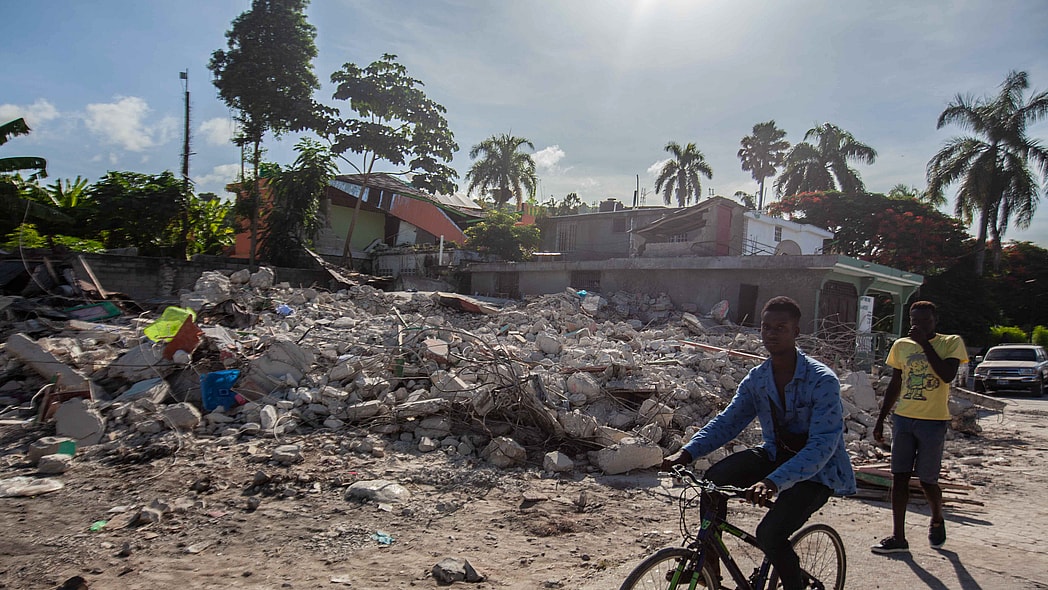Saturday’s 7.2 magnitude earthquake decimated Haiti’s southern region. Shortly thereafter, Paul Goodloe of The Weather Channel discussed how incoming storms Fred and Grace could further devastate the tropical island in the wake of the earthquake. And while Haiti’s death toll for this earthquake has topped 1,200 (1,297) — it pales in comparison to the 2010 earthquake that notably took over 200,000 lives. Although the death toll is less — the impact seems to hit just as hard as the Caribbean country seems to not have been able to catch a break in the last several months.
Just a month ago, President Jovenel Moïse was assassinated at the hands of mercenaries whose identities are still unknown to the general public. Following ex-First Lady Martine Moïse’s CNN interview, many Haitians and Haitian-Americans alike were left with more questions about what happened that fateful night and what the future of Haiti holds. The country is currently being run by Prime Minister Ariel Henry, a neurosurgeon who was appointed just days before the assassination.
And although the country hasn’t yet spun totally out of order, a natural disaster is just the last on a long list of issues plaguing the island nation.
With that, many are scratching their heads to what the emergency response will be and what will happen next? But brighter minds are wondering what lessons can be learned from the 2010 earthquake and how Haiti, her diaspora and interested parties can do better this go around?
As many understand Haiti is still dealing with the ramifications of the 2010 earthquake. The death toll, mismanagement of funds and lack of shelter that many encountered post-earthquake was only exacerbated by the cholera epidemic that quickly followed — as a result of the Nepalese peacekeepers sent to aid the country. For many, Saturday’s circumstances may have triggered an unfortunate case of PTSD as Haiti experienced yet another 7.0+ magnitude earthquake and the fallout and death toll may very well be exacerbated by the COVID-19 pandemic and current food insecurity that already exists in the forlorn country.

Les Cayes and Jérémie are bearing the brunt of the burden, as their hospitals are flooded and resources thin. And while USAID Administrator Samantha Powers and the USAID Disaster Assistance Response team have responded quickly, many are leery of organizations like the Red Cross as they remember all too well the 2010 earthquake. Millions of Americans reacted to the crisis and pledged their funds — raising nearly half a billion dollars. But where did the $500 million go?
When NPR and ProPublica sought answers they were met with responses of “poorly managed projects, questionable spending and dubious claims of success.” While the Red Cross claimed they had provided housing to over 130,000 people, reports showed the number of permanent homes that the organization had built was a resounding six. Six homes with $500 million? Despite this, the charity refuses to “provide a list of specific programs it ran, how much they cost or what their expenses were.”
When people donate to organizations like the Red Cross it is important to realize that first, the Red Cross takes an administrative cut, the charities that they disburse to take their own administrative cut, and then whatever is left goes to those in need. NPR notes that these costs took up approximately a third of the money donated to the people of Haiti. Moreover, internal memos have revealed that Haitians were not being hired for top positions when it came to construction and rebuilding.
Here’s what can be learned this time:

- Haitian organizations and diaspora organizations alike have bound together to discourage donations in kind. Because distribution is slow and there are customs issues, CASH IS KING in these dire circumstances, as it is quickly dispersed and effective.
- Cash must be injected into the local economy. When well-meaning foreigners send things like rice it floods the market and lowers the price of local rice, causing a further tilt in the economy that has already been destabilized by the natural disaster. The same goes for water, an extremely heavy commodity that is difficult to move. Instead of sending food and water, send money so that people can buy commodities that are already available on the ground.
- This is NOT a time for tourism. Organizations who do not have experience with natural disasters, collapsed buildings, etc. should not attempt to provide boots on the ground services.
- Tarp is needed — the most important thing is shelter. This is even more important than food and water.
- It is essential to work with organizations that have been there before, during and will be there after the disaster.
Here’s also a list of trusted Haitian-led organizations:
- National Organization for the Advancement of Haitians (noahny.org)
- Haitian American Nurses Association (hanaofflorida.org)
- Association Haitienne De Developpement Humain (ahdhhaiti.org)
- Man Dodo (mandodo.org)
- BLUME Haiti (blumehaiti.org)
- Gaskov Clergé Foundation (gaskov.org)
- Ayiti Community Trust (ayiticommunitytrust.org)
- Haiti Futur (haitifutur.com)
- Goodoo Courier (shipgoodoo.com)

Wen-kuni Ceant is the CEO and Co-Founder of Politicking. She is a Fulbright Scholar and through the fellowship she studied health infrastructure in Senegal during the last year. She received her Masters in Public Health in Health Management and Policy in 2016 from Drexel University. Before Drexel, she attended Howard University, in Washington, D.C. where she graduated Phi Beta Kappa and with honors with a Bachelors of Science in Biology.
Have you subscribed to theGrio’s “Dear Culture” podcast? Download our newest episodes now!
TheGrio is now on Apple TV, Amazon Fire and Roku. Download theGrio.com today!


